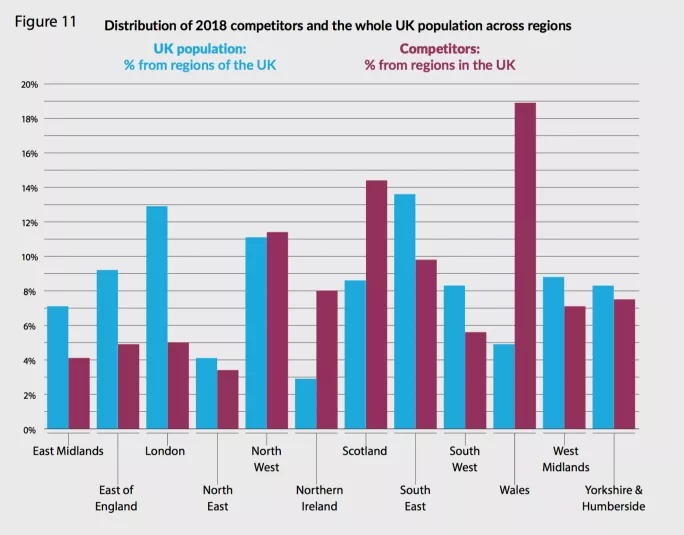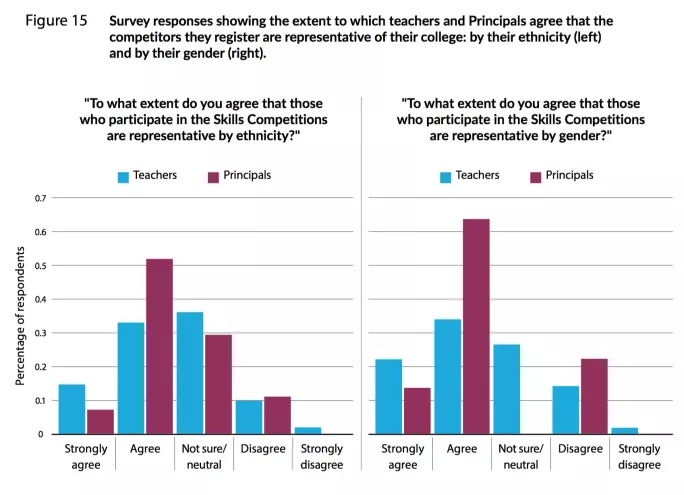
- Home
- WorldSkills UK diversity report: 6 things we’ve learned
WorldSkills UK diversity report: 6 things we’ve learned

Today, the lack of diversity in WorldSkills UK was laid bare with a report published by the organisation itself.
The report looks at everyone involved in WorldSkills UK competitions in 2018 - competitors, judges, employers and trainers - as well as data from the FE sector more widely.
The report finds that 67 per cent of the WorldSkills UK competitors in 2018 were male, and 90 per cent of competitors were White British or Irish.
News: 90% white, 67% male: The WorldSkills diversity crisis
Background: Why more diversity would make WorldSkills even better
Read more: ‘Let’s create a more tolerant and respectful culture’
Here are the findings behind the headlines.
Skills competition judges
The lack of diversity isn’t contained to competitors. Just 20 per cent of the skills competition judges were female, 8 per cent were BAME, 10 per cent LGBT, and 4 per cent had a disability or special educational need.
Training managers, too, tended to be white and male. Some 14 per cent of training managers in 2018 were female, 7 per cent were BAME, 7 per cent were LGBT and 0 per cent had a disability or special educational need.
Barriers to competition
While there are no fees charged for competing in WorldSkills UK competitions, competitors do have to travel to regional and national arenas to compete. Some 23 per cent of tutors and trainers agreed that students’ financial difficulties can prevent them from being able to participate.
Also, 60 per cent of tutors and employers didn’t agree that their most skilled students were always able or willing to take part, suggesting that there are practical or motivational barriers to attracting the most skilled students to participate.
Researchers asked tutors, apprentice trainers and employers what barriers would prevent them from registering students for competitions. In total, 42 respondents cited competing personal priorities, 36 said economic status and financial challenges, 32 said childcare and family responsibilities and 17 said lack of support from family. Some 74 respondents said there were no barriers that would prevent them from registering a student.
The language of winning
The researchers ran the introductory text on the WorldSkills UK website through a gender decoder, which found that the text was strongly masculine-coded through uses of “competition” or “competing” - and that these were not balanced against any female-coded words such as “connect”, “cooperate” and “together”.
The report says: “Using language like ‘competitions’ and ‘winning’ could result in women self-selecting out because they believe they are intrinsically unsuitable.” It encourages WorldSkills UK to be conscious about how they communicate to potential competitors and avoid unintended language bias.
Regional participation in WorldSkills
The report breaks down the 2018 competitors that are registered by employers in terms of where they came from in the UK.
In England, the South East registers the most competitors, followed by the North West and East Midlands, South West and West Midlands. The North East and London register the fewest.
Out of Wales, Scotland and Northern Ireland, Wales registers the most competitors, followed by Scotland and then Northern Ireland.

Which provider gets the most medals?
The researchers found that competitors who are registered by an employer are most likely to win a medal.
Employers entered 290 competitors in 2018, 18 per cent of those achieved a medal. In comparison, further education colleges registered 2371 competitors, of which 7 per cent achieved a medal.
A member of the WorldSkills UK Diversity and Inclusion Advisory Group says in the report: “If the large majority of registrants are coming from FE colleges, but the highest concentration is medalists and Skills Champions is coming from employers, there is clearly already a disconnect.”
Being representative of UK colleges
College principals and teachers were asked: “To what extent do you agree that those who participate in the skills competitions are represented by ethnicity and gender?”
Some 74 per cent of principals strongly agreed that their competitors were ethnically representative of their college and 78 per cent agreed that they were representative by gender. Tutors were less sure - 37 per cent indicated that they didn’t know and 55 per cent agreed strongly on ethnicity and 56 per cent on gender.

One principal was quoted as saying: “It’s a no-brainer to me that city colleges are missing out and they’re the ones with the diversity.”
Register with Tes and you can read five free articles every month, plus you'll have access to our range of award-winning newsletters.
Keep reading for just £4.90 per month
You've reached your limit of free articles this month. Subscribe for £4.90 per month for three months and get:
- Unlimited access to all Tes magazine content
- Exclusive subscriber-only stories
- Award-winning email newsletters
You've reached your limit of free articles this month. Subscribe for £4.90 per month for three months and get:
- Unlimited access to all Tes magazine content
- Exclusive subscriber-only stories
- Award-winning email newsletters



